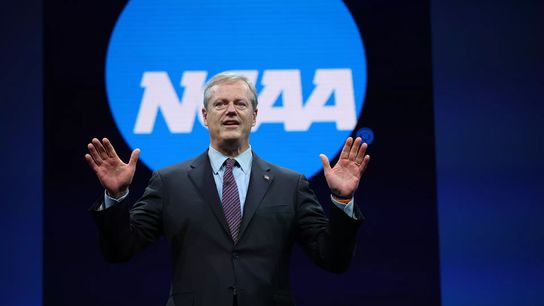Speaking in Indianapolis, hometown of its headquarters, NCAA President Charlie Baker divulged that college athletics' top governing body ... will not be governing NIL, if the House Settlement finally passes as expected.
During the Knight Commission's annual spring meeting, held this day inside Indianapolis' downtown Marriott, Baker told the assembled crowd that college athletics' Power Conferences -- ACC, Big Ten, Big 12 and SEC -- would have oversight of implementing the rules of the long-awaited House Settlement -- if the measure is granted final approval in the coming days or weeks in the Oakland, California, courtroom of U.S. District Court of Northern California Judge Claudia Wilken.
Baker, as detailed by Front Office Sports, among other outlets, disclosed that the Power Conferences would have oversight of the revenue-sharing distribution component, as well as of the vetting of Name, Image and Likeness. (NIL) deals.
The settlement, in the range of $2.8 billion and already agreed to by both sides but awaiting Wilken's stamped approval, not only outlines the revenue-distribution component moving forward, with the measure set to start at up to $20.5 million in distribution per participating school July 1 of this year, but also provides backpay compensation from the NCAA as part of the settlement terms.
Additionally, the future vetting of NIL deals would include a third-party arbiter -- Deloitte, which would be in charge of determining fair-market value of NIL deals for student-athletes in excess of $600.
More details of the Knight Commission's spring meeting agenda can be found here: Knight Commission Convenes in Indianapolis.
The news about the NCAA's imminent step-back process arrives as all the Power Conferences hold their own various spring meetings. The ACC's meetings concluded last week in Florida; the Big Ten's are presently in session in Los Angeles and next week, the SEC meets in Sandestin, Florida, for its annual gathering of all conference leaders, including SEC Commissioner Greg Sankey, as well as every member school's president, athletics director and head football coach, among other dignitaries. Big 12 Conference meetings also are scheduled in the coming days.
Baker, as quoted in the Front Office Sports report, says, "The Power Conferences' response is to create an entity, the College Sports Commission. The point behind that (College Sports Commission) was to create an entity that would see the cap management system and and the third-party NIL system, have rules associated with both; create enforcement parameters for violating those rules under the rubric that would be the theoretical injunction."
In layman's terms: it's a step from college's athletics latest, emerging power structure to lend some semblance of guardrails and oversight in the upcoming revenue-sharing era in order to slow down or thwart what essentially is the current "pay-for-play" system, as an NCAA official detailed earlier this month at the National Football Operations Organization's annual meetings in Frisco, Texas, and as FootballScoop previously detailed.
ESPN has previously reported that the CEO of the fledgling, not-yet-fully-formed College Sports Commission, would be granted power moving forward to dole out discretionary punishments if it is determined that a school violated or circumvented the parameters of the House Settlement revenue-sharing agreement and corresponding terms.
Every conference, in same fashion, is not only confronting the expected knowns of the proposed House Settlement but also dealing with the still-gray areas; indeed, without federal regulations or oversight, state laws continue to take centerstage, such as Tennessee's Danny White, the school's fourth-year athletics director and former UCF boss, indicating the Vols would adhere to the state's regulations and not the more stringent cap of the $20.5 million proposed by the House Settlement -- a number that sources told FootballScoop was a step in the right direction favored by Sankey for a potentially more equal playing field in the league.
Additionally, the Power Conferences continue to game plan strategy surrounding the upcoming 12-team College Football Playoff, the last agreed-upon format, as well as the imminent expansion of the field to at least 14 if not 16 teams in 2026.
